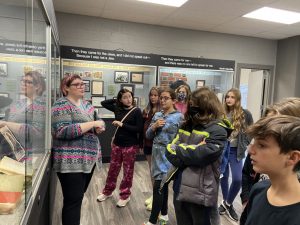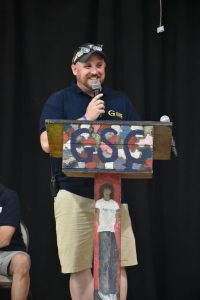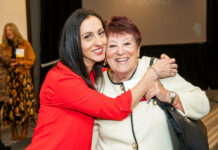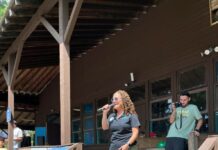
Katie Lowe, program and collections director at the Holocaust Awareness Museum and Education Center, knew she had Jewish relatives since she was a young girl, but she was never supposed to ask about it.
Her great-grandmother’s generation, originally from Eastern Europe, experienced profound antisemitism upon settling in Allentown, and that generation, as well as Lowe’s grandmother and her siblings, converted to the Moravian Church.
“I wasn’t allowed to ask those questions of my grandmother, in particular, because it brought up really difficult memories for her,” Lowe said.
But despite not growing up Jewish — even being dissuaded from engaging with the religion — Lowe still found a professional home at HAMEC, working to preserve stories of the Holocaust and educate Jews and non-Jews alike on the dangers of antisemitism.
Lowe’s story does more than just prove that non-Jewish employees can lead in Jewish organizations; her story shows the impact that religiously diverse leaders can have in their workplace.
Lowe reconnected with her Jewish roots during her master’s program at the University of North Carolina at Greensboro, where she worked with Professor Anne Parsons on a Roots of Resistance exhibit on the Holocaust. Lowe learned more about her family’s story indirectly through learning about Jews in Eastern Europe.
“I began to feel a great sadness that my family had once done something so brave, so terrifying,” she said.
For Lowe, her family’s history gives her personal stakes in Holocaust education.
“Though my family was in Allentown, which isn’t the same as Philadelphia, I almost feel like I get to interact with their story even more by hearing stories of people who came from relatively the same places to a similar place around the same time,” Lowe said of working at HAMEC.
Moreover, though her family’s Judaism is lost, Lowe’s commitment to learning and preserving her history has become her praxis to combating antisemitism.
“Active remembrance is a form of resistance against antisemitism, against denialism, against all of the forces that pushed my family and past generations to stop practicing their faith, to stop being loud and open about who they were,” she said.
Like Lowe, Justin Guida, director of Golden Slipper Camp, has Jewish family ancestry but doesn’t identify as Jewish.

Guida was raised Catholic but found out later in life that members of his father’s side of the family were Jewish. His last name, pronounced “Gwee-duh,” used to be pronounced the more Semitic-sounding “Guy-duh.”
Though director since 2018, Guida was a counselor at Golden Slipper decades prior when a couple of his Jewish friends told him about the camp.
“It really changed my life,” he said.
Guida is in good company at camp: About 30% of campers aren’t Jewish, and, though led by Jewish values, Golden Slipper also offers Christian and non-denominational Saturday services alongside Shabbat services.
As a counselor, Guida attended the different services, eventually leading the non-denomination services. Golden Slipper gave Guida that chance to find meaning in other religions, which has helped connect him with Jewish culture and educate non-Jews on Judaism.
The mutual respect at camp is what helps create cohesion.
“When you’re in your teens and 20s, you’re exploring or trying to understand things you didn’t understand before … so that conversation, it just connects you to people,” Guida said. “Because regardless of what you were raised as, or what your religious beliefs are, we’re all connected.”
Finding belonging isn’t always so easy, however.
Leah Dukes, HAMEC’s education director who does not have a religious affiliation, said that when people realize she isn’t Jewish, they have questions: What personal connection do you have to the Holocaust? Why are you interested in this topic?
Dukes first became interested in the Holocaust after she heard two survivors speak at a second-grade assembly in her home state of South Carolina. Because the experience resonated with her so much, she realized the power of sharing survivors’ stories with diverse audiences.
“Learning the Holocaust is something that is for everyone,” she said. “The lessons learned can benefit non-Jewish people as well as Jewish people.”
Jewish organizations with non-Jewish leaders exemplify a lesson in humanity, according to Jewish Federation of Greater Philadelphia’s Mitzvah Food Program Operations Manager Whitney Drukier, who is Catholic, but is married to her Jewish husband and is raising her children with both religions.
Like HAMEC and Golden Slipper, the Mitzvah Food Program serves non-Jewish clientele. Having a religiously diverse staff not only means different points of view to determine how the organization operates, but also fosters deeper empathy for interacting with community members in need, Drukier said.
“At the heart of it, it’s really about giving back to the community,” she said. “And I don’t think that that’s a religious thing; I think that’s just a humanitarian thing.”






